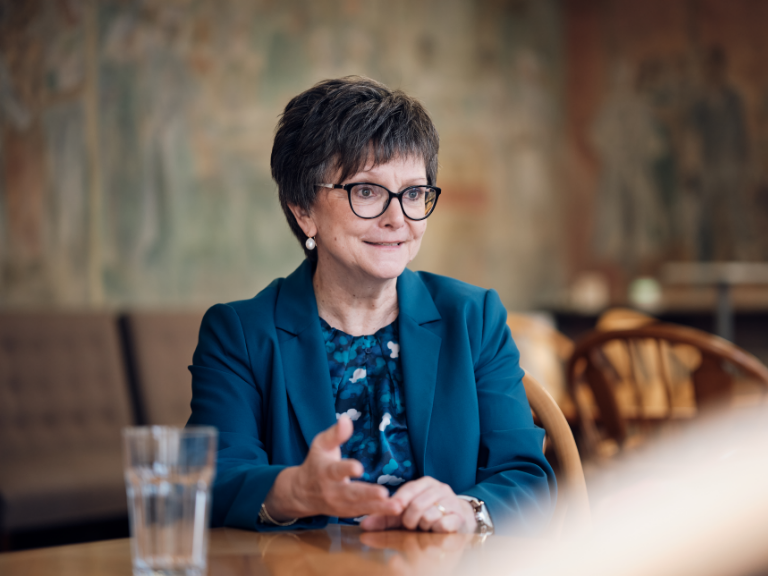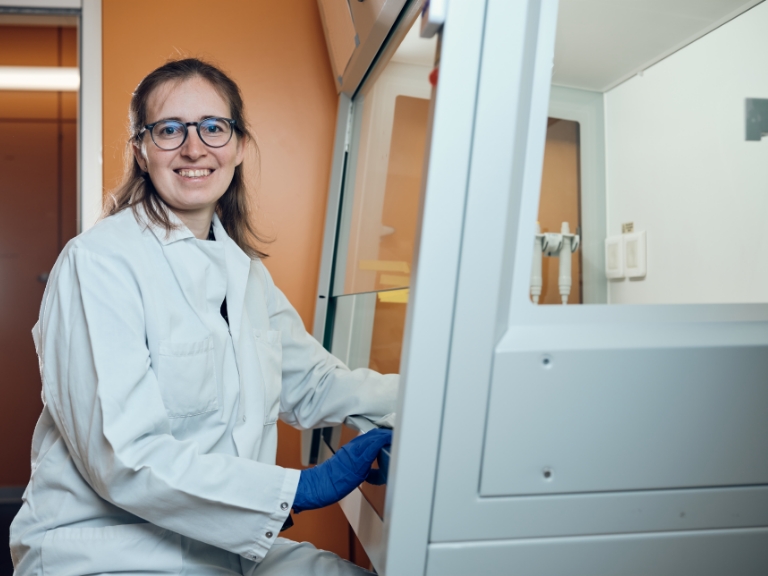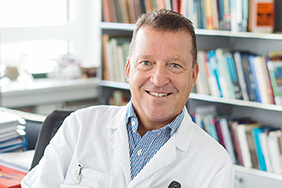Department of Clinical Research
Eva Segelov: A career supporting better research
Good research should begin where it matters most: with people – this is the guiding vision of Eva Segelov. Since the end of 2022, the Australian oncologist and clinical researcher has been serving as Director of the Department of Clinical Research at the University of Bern.
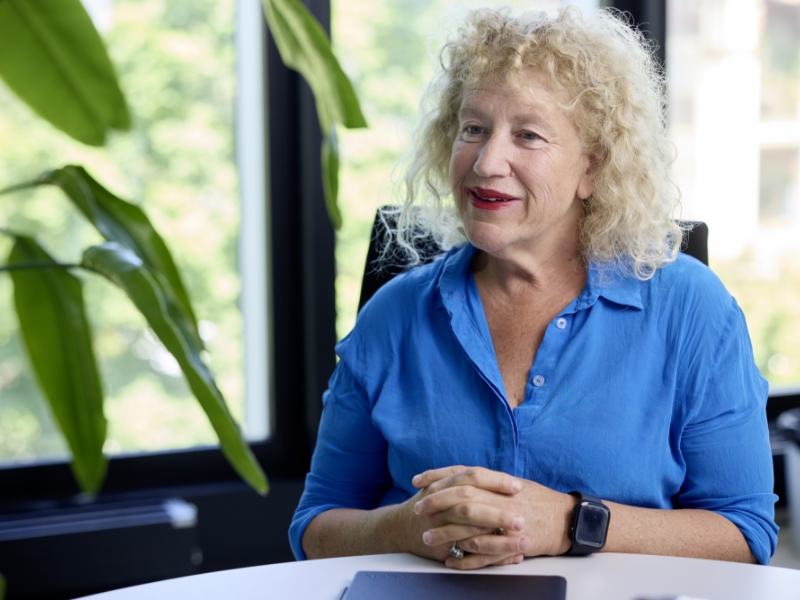
From an early age, Eva Segelov knew she wanted to become a doctor. Inspired by her father, an orthopedic surgeon, she witnessed the impact a physician could have on people’s lives. Surgery, however, was not for her – she lacked the manual dexterity it required. After completing her medical degree at the University of Sydney, she explored a range of specialties in search of the right path. One field she deliberately avoided was oncology: its image was simply too grim. “In the early 1990s, treatment options for cancer were still very limited,' Segelov recalls. 'There were no effective remedies for nausea, and many patients were seriously ill, spending their final days in hospital without hope of recovery. I didn’t want to expose people to harsh side effects without being able to truly help them get better.”
Improving patients’ lives
Despite her initial reluctance, one of Segelov’s assistant posts required a rotation in oncology and already on her very first day she knew she had found her calling. In the outpatient clinic, some patients came for treatment or check-ups with the hope of being cured. But for many others, the focus was on preserving quality of life in the time they had left, enabling them to reach important personal milestones. Segelov quickly realized how crucial empathy, sensitivity, and clear communication are in tailoring the right treatment for each individual.
From that moment, she committed herself to clinical oncology. In 1997, she earned her doctorate at the University of Sydney and went on to work in several Australian university hospitals. There, she treated patients with breast and gastrointestinal cancers, as well as rare neuroendocrine tumors, malignancies that develop from hormone-producing cells. Because treatment options were limited at the time, clinical trials became a core part of her work. “I wanted to understand why a particular therapy helps one person but not another,” Segelov explains. “For me, research has always been the path to better care.”
Subscribe to the uniAKTUELL newsletter

Discover stories about the research at the University of Bern and the people behind it.
An internationally connected career
While many of her peers spent several years abroad doing research after their medical training, Segelov chose to remain in Australia first in Sydney, and from 2017 in Melbourne. “My husband is also a doctor, and we wanted to start a family. The chances of both of us finding suitable positions abroad at the same time seemed very slim,” she explains.
As a working mother of a son and two daughters, Segelov nevertheless built a broad international research network. She led multinational clinical trials on neuroendocrine tumors, co-founded a research consortium with colleagues from Canada and New Zealand, and helped develop global guidelines for the standardized evaluation of clinical trial quality. “You don’t necessarily have to live abroad to work internationally,” she says. “But I always had the feeling that one day I wanted to experience working in another country.”
A coincidence – and a new start in Switzerland
The opportunity arrived just before the outbreak of the Covid pandemic: an email from an international recruitment agency, searching on behalf of the University of Bern for a Director of its newly founded Department of Clinical Research (DCR). “I skimmed the job description and immediately deleted it,” Segelov recalls with a smile. But a week later she pulled the message back out of the trash folder. Her children were now grown and living on their own, and she felt ready for a fresh start. She asked her husband whether he would move to Switzerland if she got the job. His answer: “Why not?”
Segelov’s candidacy was convincing, and in December 2022 she and her husband relocated to the Swiss capital. She has been Director of the DCR ever since.
“For me, research has always been the path to improving medical care.”
Eva Segelov
While preparing for the move, Segelov stumbled across a letter she had written to her father back in the 1980s as a medical student. Describing her trip through Europe, she had complained about Bern: “It’s so cold, I don’t understand how people can live here!” Today, she and her husband have grown fond of the city even in winter. They appreciate Bern’s charm, the ease of getting around Switzerland without a car, the closeness to nature, and, unlike in Melbourne, the fact that houses are properly heated. Above all, though, as Director of the Department of Clinical Research, Segelov relishes the chance to focus entirely on research for the first time in her career and to build something truly distinctive.
Research that matters to people
The fates of her patients have always stayed with her. Even today, Segelov remembers most of their names and stories and she still receives letters and messages from cancer survivors she once treated. Stepping away from her clinical work was not easy. “In my new position, I can do more than just help individual patients,” she says. “Now I can draw on all my experience to make medical research more efficient, more accessible, and more relevant and in doing so, achieve more for society as a whole.”
“In my new position, I can do more than just help individual patients.”
Eva Segelov
Your input is welcome: Patient and Public Involvement
One initiative Segelov is especially proud of is the Panel for Patient and Public Involvement (PPI), which she established at the DCR. The panel brings together 40 to 50 people from patient organizations and the wider public to play an active role in planning and carrying out clinical trials. Their input ranges from checking whether information sheets and questionnaires are understandable to laypeople, to evaluating whether research questions are relevant and study designs practical.
For example: would patients prefer to complete all their examinations in a single day, or spread them over several weeks? “A single mother sees things differently than a full-time student or a pensioner,” Segelov explains. “When we conduct research with people rather than just about them, it ensures that our limited resources go into trials that are truly meaningful and feasible.”
Rethinking clinical trials: decentralized and digital
Modernizing the way clinical trials are conducted is another of Segelov’s priorities. “These days, not all trials have to take place in hospital wards,” she notes. In Australia, she helped pioneer so-called teletrials, studies in which participants can take part through their family doctors, video consultations, and digital tools. “This opens up new opportunities, especially for people in remote areas or those with care responsibilities who might otherwise be excluded from clinical trials,” says Segelov. She also sees great promise in wearable medical devices and electronic diaries, which can capture the day-to-day reality of participants’ lives more accurately and in doing so, make research more relevant and meaningful.
“Research with people instead of just about them: this allows us to use limited research funds on trials that are actually relevant and feasible.”
Eva Segelov
Equality: more role models, more diversity
Eva Segelov is particularly passionate about gender medicine and ensuring that women are better represented in clinical trials. “Women are still underrepresented, even though diseases can progress differently in women and treatments may affect them in other ways,” she explains. The imbalance extends beyond research subjects: women remain a minority in senior positions in medical science. “Building a career in research is still harder for women. Even as professors, they are often taken less seriously than their male colleagues,” she says. She recalls meetings where, as the only woman at the table, male colleagues would stand up and noisily make coffee just as she began to speak. As a mentor in the FELS (Female Empowerment in Life Sciences) network, Segelov is determined to support the next generation of women scientists. Her advice: “Take your time, find allies and stay visible. Science needs you.”
About the person
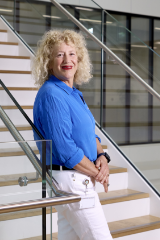
Prof. Eva Segelov is a clinical oncologist and, since December 2022, Director of the Department of Clinical Research at the University of Bern. Born in Sydney in 1965, she studied medicine at the University of Sydney, graduating in 1987, and went on to complete her doctorate there in 1997. Before moving to Bern, she worked at several Australian university hospitals, where she combined clinical practice with research, focusing primarily on gastrointestinal and neuroendocrine tumors as well as breast cancer.
Department of Clinical Research (DCR)
Founded in 2019 as a joint initiative of the University of Bern’s Faculty of Medicine and Bern University Hospital, the Department of Clinical Research (DCR) brings together the university’s key clinical research units under one roof: the Clinical Trials Unit (CTU), the Clinical Investigator Unit (CIU), the Medical Data Science Unit, and the Gender Medicine Unit. The DCR supports clinical studies from initial concept through to implementation, offering consulting, infrastructure, methodological expertise, and quality assurance. It collaborates closely with researchers from the Faculty of Medicine and the university’s clinics, including Bern University Hospital and the University Psychiatric Services (UPD), with a strong emphasis on interdisciplinary exchange. Its mission: to advance clinical research that is excellent, relevant, and people-centered – for the benefit of patients and society at large.
Further information: dcr.unibe.ch
